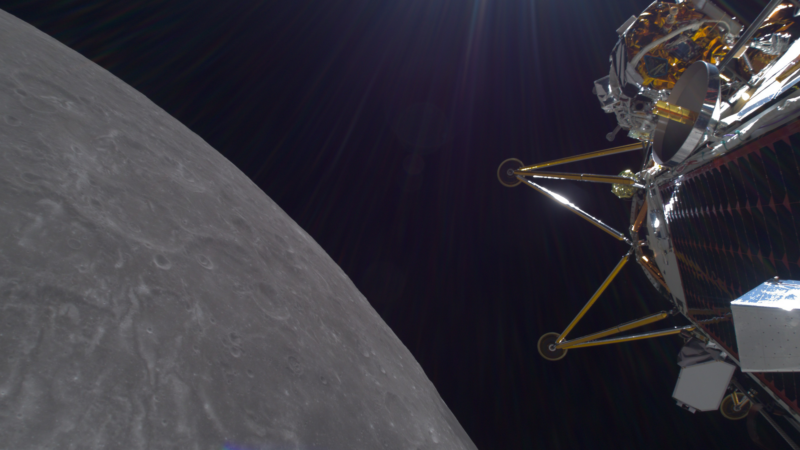Intuitive Machines probe is on the moon but its status is uncertain
A commercial lunar lander built by Intuitive Machines has landed on the moon in a second try for the Houston-based company after its first attempt last year resulted in a lander tipped over on its side.
The touch down occurred around 12:30 EST. The uncrewed Athena lander made an autonomous decent at Mons Mouton, a flat-topped mountain around 100 miles from the moon’s south pole. The site is the farthest south of any lunar soft-landing.
It wasn’t immediately clear, however, whether the company’s Athena lander had suffered the same fate as its predecessor. Mission control reported that it had powered down some flight systems and that the craft was generating solar power. But there was no immediate word on whether the vehicle was in an upright configuration.
“I’m showing that we are sensing lunar acceleration,” mission director Tim Crain told the Intuitive Machines team in mission control. “So we’re on the surface, let’s evaluate.”
The company says it plans an update at 4PM Eastern Time.
The solar-powered probe is a little over 15 feet tall, which according to the company is “roughly the height of a shorter adult giraffe.” On board is a drill built by NASA that will drill about three feet below the lunar surface to check for volatile compounds, including water.
Some craters near the south pole of the moon are in permanent shadow, and researchers believe there might be water ice hidden beneath the surface. That water would be essential for any future moon base, which would use it for drinking and as rocket fuel. Multiple nations are vying to be the first to the lunar south pole and lay claim to some of the water, if its there.
The Athena probe is designed to stay put once it lands, but it’s carrying a number of little rovers that will take a look around. One, called Grace, will hop across the lunar surface using a small rocket engine. Another small rover will attempt to drive autonomously around the lunar surface. Japan’s Dymon Corporation has also included a tiny roly-poly little device called YAOKI, that will snap a few pictures.
Landing on the moon is difficult. Because it has no atmosphere, landers can’t depend on parachutes or other passive equipment to slow their descent. On top of that, the distance from the moon to the earth makes human control impossible, so robotic probes must touch down autonomously. That means the probe must fire rocket engines in a precise sequence to steer its way past rocks, craters and other obstacles, in order to find a perfect landing site.
Adding to the difficulty is that commercial missions frequently operate on a lower budget in exchange for a higher risk of failure. That danger was apparent yesterday, when NASA said it had lost contact with another mission called Lunar Trailblazer that was sharing a ride with Athena to the moon.
Last year, Intuitive Machines became the first commercial mission to touch down on the lunar surface, but it wasn’t a complete success. The probe misjudged its rate of descent and hit the moon hard, snapping a leg and tipping onto its side.
The Intuitive Machines landing comes less than a week after another company, Firefly Aerospace, made its first-ever successful landing on the lunar surface. Both missions are part of NASA’s Commercial Lunar Payload Services initiative, which is seeking to harness private industry to explore the moon.
Rideshare union rights, social media limits and other state laws taking effect Jan. 1
Every new year, public media reporters across the country bring us some of the new state laws taking effect where they are. Here are six in 2026.
Guides to help you tackle your New Year’s resolutions
From building your strength to tackling credit card debt, NPR's Life Kit has a newsletter journey to help you tackle your New Year's resolution.
Guides to help you tackle your New Year’s resolutions
From building your strength to tackling credit card debt, NPR's Life Kit has a newsletter journey to help you tackle your New Year's resolution.
Dozens presumed dead in fire at Swiss Alps bar during New Year’s celebration
Dozens of people are presumed dead and about 100 injured, most of them seriously, following a fire at a Swiss Alps bar during a New Year's celebration, police said Thursday.
Warren Buffett officially retires as Berkshire Hathway’s CEO
The legendary 95-year-old investor spent decades building his company into one of the world's largest and most powerful. Now Greg Abel is taking it over.
Crypto soared in 2025 — and then crashed. Now what?
For most of 2025, cryptocurrencies such as bitcoin surged as President Trump vowed to make the U.S. a crypto leader. But now, a severe sell-off has shaken the sector.






